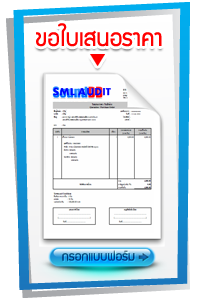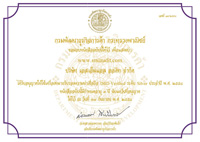บริษัท เอสเอ็มแอล ออดิท จำกัด เลขทะเบียนนิติบุคคล 0115555017811 -สาขาบางนา,สมุทรปราการ
ที่อยู่ : เลขที่ 59/294 ซ.อ๊อกฟอร์ด 2 ถนนศรีนครินทร์ บ้านกลางเมือง British town หมู่ 16 ตำบล : บางแก้ว
อำเภอ : บางพลี จังหวัด :สมุทรปราการ รหัสไปรษณีย์ : 10540
มือถือ : 080-553-7088 /080-5537077 โทร :023494340 /02-758-8994 แฟกซ์ : 021020819
อีเมล :sale@smlaudit.com, smlaudit@hotmail.com
เว็บไซต์ : www.smlaudit.com
| Starting A Business in Thailand. In order to set up a limited company in Thailand, the following procedures should be followed: 1. Reservation of your Corporate Name
The name to be reserved must not be the same or similar to the name of any other companies. There are names that are not allowed and the name reservation guidelines of the Commercial Registration Department in the Ministry of Commerce need to be observed. The approved corporate name is valid for 30 days. No extension is allowed. 2. File a Memorandum of Association
A Memorandum of Association must be filed with the Commercial Registration Department. This has to include the name of the company that has been successfully reserved, its business objectives, the capital to be registered, the province where the company will be located, and the names of the seven promoters. The capital information must include the number of shares and the value per share. At the time of formation, the authorized capital, although partly paid, must all be issued. Although there are no minimum capital requirements, the amount of the capital should be of a respectable amount, and adequate for the business operation to function healthily. The Memorandum registration fee is 50 baht for every 100,000 baht of registered capital. The minimum fee is 500 baht, and the maximum is 25,000 baht. 3. Convene a Statutory Meeting
Once the share structure has been decided, a statutory meeting needs to be called, during which the bylaws and articles of incorporation are approved, the Board of Directors are nominated and an auditor selected. A minimum of 25% of the value of each subscribed share must be paid. 4. Registration
Within three months of the date of the Statutory Meeting, the directors must submit their application to establish the company. 5. Tax Registration
Within 60 days of incorporation, or within 60 days of the start of operations, businesses liable for income tax must obtain a tax identity card and a number for the company from the Revenue Department. Business operators earning more than 1,800,000 baht per annum must register for VAT within 30 days of the date they reach that figure in sales. REPORTING REQUIREMENTS
Companies must keep accurate books and follow the accounting procedures which are specified in the Accounts Act, the Civil and Commercial Code and the Revenue Code. Documents may be prepared in any language, provided that a Thai translation is attached. All accounting entries should be typewritten, printed or written in ink. Specifically, Section 1206 of the Civil and Commercial Code provides rules on the accounts that should be maintained as follows: "The directors must cause true accounts to be kept: Of the sums received and expended by the company and of the matters in respect of which each receipt or expenditure takes place. Of the assets and liabilities of the company." 1. Imposition of Taxes
Companies are required to withhold income tax from the salary of all regular employees. Value Added Tax of seven per cent is levied on the value added at each stage of the production process, and is applicable to most firms. This VAT must be paid every month. A specific business tax is levied on companies that engage in several categories of businesses that are not subject to VAT. This tax is based on gross receipts, at a variable rate ranging from 0.1 % to 3.0 %. Corporate income tax is 30 % of net profits and is due twice each economic year. A mid-year profit forecast entails advance payment of these corporate taxes. 2. Annual Accounts
A newly-established company or partnership should close accounts within 12 months of the date of registration. Thereafter, these accounts should be closed every 12 months. The performance record has to be certified by the company auditor, approved by the shareholders, and filed with the Commercial Registration Department, at the Ministry of Commerce, within five months of the end of the financial year, and with the Revenue Department, at the Ministry of Finance, within 150 days of the end of the financial year. If a company wishes to change its accounting period, it must obtain written approval from the Director General of the Revenue Department. 3. Accounting Principles
Broadly speaking, accounting principles practised in the United States are acceptable in Thailand , as are accounting methods and conventions as sanctioned by law. The Institute of Certified Accountants and Auditors of Thailand is the authoritative group promoting the application of generally accepted accounting principles. Any accounting method that a firm chooses to adopt must be used consistently, and may be changed only with approval of the Revenue Department. Certain accounting practices of note include:
Depreciation
The Revenue Code permits the use of varying depreciation rates according to the nature of the classes of assets which have the effect of depreciating the assets over periods that may be shorter than their estimated useful lives. These maximum depreciation rates are not mandatory; a company may use lower rates that approximate the estimated useful lives of the assets. But if a lower rate is used in the books of the accounts, the same rate must be used in the income tax return. Accounting for Pension Plans
Contributions to a pension or provident fund are not deductible for tax purposes unless these are actually paid out to the employees, or the fund is approved as a qualified fund by the Revenue Department and is managed by a licensed fund manager. Consolidation
Local companies with either foreign or local subsidiaries are not required to consolidate their financial statements for tax and other government reporting purposes, except for listed companies which must submit consolidated financial statements to the Securities and Exchange Commission of Thailand. Statutory Reserve
A statutory reserve of at least five percent of the annual net profits arising from the business must be appropriated by the company at each distribution of dividends until the reserve reaches at least 10 % of the company's authorized capital. Stock Dividends
Stock dividends are taxable as ordinary dividends and may be declared only if there is an approved increase in authorized capital. The law requires the authorized capital to be subscribed in full by the shareholders. 4/ Auditing Requirements and Standards
Audited financial statements of juristic entities (that is, a limited company, a registered partnership, a branch, or representative office, or a regional office of a foreign corporation, or a joint venture) must be certified by an authorised auditor, and submitted to the Revenue Department and (except for joint ventures) to the Commercial Registrar for each accounting year. Auditing standards conforming to international auditing standards are, to the greater extent, recognised and practised by authorised auditors in Thailand .
• Foreigners can form companies in Thailand but should seek expert legal advice.
• You must have 3 shareholders to form a Limited company. You must also maintain 3 shareholders at all times
• A company must be registered with a valid corporate address. In most cases it is not possible to register in a condominium or home; it must be a commercial address. see virtual office .
• If your company will require work permits, you must have registered the company in an actual office/commercial facility with a designated working area. see executive desk .
• Shares can be owned 100% by foreigners who can be individuals or entities, unless the intended business objectives are reserved for Thai nationals under the Foreign Business Act, which requires the company to apply for an Alien Business License prior to commencement of the business. If a company has one Thai shareholder holding 51% of the shares then this is not a foreign company under Thai law and does not fall under the Foreign Business Act. A number of foreign investors are able to find local partners to invest in the business while still others need help in locating a Thai partner. Our parent company, Sunbelt Asia acquisition is part of the World's largest business advisor network with over 400 Worldwide; which specializes in linking Thai investors and foreigners together. Your countries embassy commercial services and chambers of commerce may also assist in finding a Thai shareholder.
• Nominee shareholders are Thai nationals who agree to hold shares on behalf of the true owner(s) of the shares and are shareholders in name only. Under this arrangement, typically they are given shares of a business so that they own 51% or more of that business, but the true foreign owner retains all voting rights, rights to receive dividends of the shares. The Foreign Business Act prohibits Thai nationals from acting as "nominee" shareholders with the penalties ranging from fines of 100,000 baht to one million baht and terms of imprisonment of up to three years or both. Sunbelt strongly advocates foreigners to not use Thai “nominee” shareholders to hold shares to evade the laws. A Thai entity that is not a nominee but allowing you control over your investment and the Thai's paid up capital can be found using Sunbelt Asia acquisition department.
• All Thai limited companies will be investigated if the foreigner invests from 40% or higher but is not a foreign company or a business that has the foreigner as the authorized director who can act on behalf of the company, if the investment was made in the form of money, the Thai shareholders shall submit the proof showing the source of the invested money from the Thai shareholder. The proof may be a copy of a bank account book or copy of a bank statement of the latest 6 months, a document issued by the bank certifying the financial status of each Thai shareholder, or other proof showing the source of the investment. This proof is needed to be submitted together with the application form of the business registration. The evidence shall contain the details that are harmonious with the investment. If the proof is not satisfied to the Registrar, the Registrar shall deny registering the business.
• Depending on your Thai shareholder, some shareholders will allow the foreigners to maintain complete control over their company by using a preferred share structure. The implementation of this structure changes the voting rights of the majority Thai shareholding to 10 shares = 1 vote. The foreign owned shares would remain 1 share = 1 vote thereby giving the foreigner a voting supermajority, and full control over all aspects of the company and investment. Under Thai law only if 50% or more of its shares are held by non-Thai's (individuals or business entities) is the company considered foreign not if is controlled by a foreigner.
• Each shareholder may pay for the shares by using either cash or non-cash assets such as equipment, inventory or other property. Each shareholder is required to pay into the company a minimum of 25% of their shares par value. Even if a shareholder pays the minimum 25% of the shares par value upon registration, the shareholder's potential liability associated with the company's activities is 100% of the shares' par value.
|
จดทะเบียน-Register



 บุคคลทั่วไป 6 คน
บุคคลทั่วไป 6 คน

